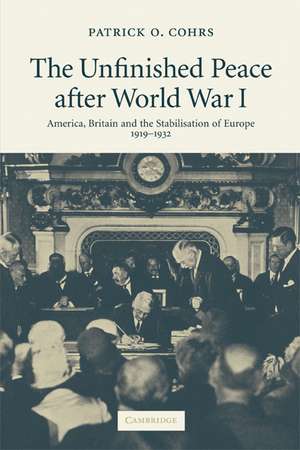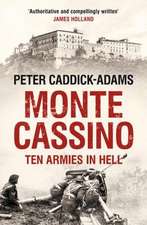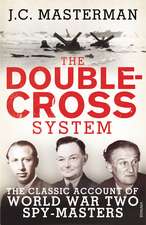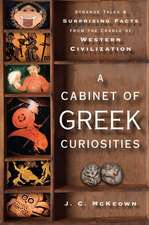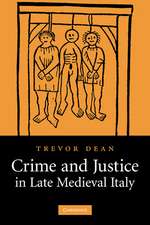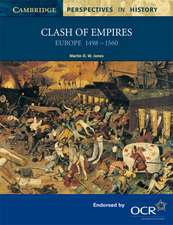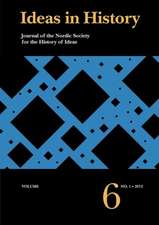The Unfinished Peace after World War I: America, Britain and the Stabilisation of Europe, 1919–1932
Autor Patrick O. Cohrsen Limba Engleză Paperback – 10 feb 2008
| Toate formatele și edițiile | Preț | Express |
|---|---|---|
| Paperback (1) | 365.55 lei 6-8 săpt. | |
| Cambridge University Press – 10 feb 2008 | 365.55 lei 6-8 săpt. | |
| Hardback (1) | 967.49 lei 6-8 săpt. | |
| Cambridge University Press – 16 mar 2006 | 967.49 lei 6-8 săpt. |
Preț: 365.55 lei
Nou
Puncte Express: 548
Preț estimativ în valută:
69.94€ • 73.04$ • 57.76£
69.94€ • 73.04$ • 57.76£
Carte tipărită la comandă
Livrare economică 15-29 aprilie
Preluare comenzi: 021 569.72.76
Specificații
ISBN-13: 9780521723435
ISBN-10: 0521723434
Pagini: 708
Ilustrații: 1 map
Dimensiuni: 152 x 229 x 36 mm
Greutate: 1.1 kg
Ediția:1
Editura: Cambridge University Press
Colecția Cambridge University Press
Locul publicării:Cambridge, United Kingdom
ISBN-10: 0521723434
Pagini: 708
Ilustrații: 1 map
Dimensiuni: 152 x 229 x 36 mm
Greutate: 1.1 kg
Ediția:1
Editura: Cambridge University Press
Colecția Cambridge University Press
Locul publicării:Cambridge, United Kingdom
Cuprins
Prologue: the truncated peace of Versailles and its consequences, 1919–23; 1. The wider challenges: the legacy of the 'Great War' and the era of imperialism; 2. Wilson, Lloyd George and the quest for a 'peace to end all wars'; 3. The ill-founded peace settlement of 1919; 4. The escalation of Europe's post-Versailles crisis, 1920–23; Part I. The Anglo-American Stabilisation of Europe, 1923–4: 5. Towards a progressive transformation of European politics: the reorientation of American stabilisation policy, 1921–3; 6. Towards transatlantic co-operation and a new European order: the reorientation of British stabilisation policy, 1922–4; 7. The turning point - the Anglo-American intervention in the Ruhr crisis; 8. From antagonism to accommodation: the reorientation of French and German postwar policies, 1923–4; 9. The two paths to the London conference: the Dawes process and the recasting of European international politics; 10. The first 'real' peace settlement after World War 1: the London agreement of 1924 and the consequences of the 'economic peace'; Part II. Europe's Nascent Pax Anglo-Americana, 1924–5: 11. The dawning of a progressive Pax Americana in Europe?; 12. Towards the Locarno pact - Britain's quest for a new European concert, 1924–5; 13. Regression? US policy and the 'political insurance' of Europe's 'economic peace'; 14. Beyond irreconcilable differences? German and French approaches to Locarno; 15. The path to Locarno - and its transatlantic dimension; 16. The second 'real' peace settlement after World War I: the Locarno conference and the emergence of a new concert of Europe; Part III. The Unfinished Transatlantic Peace Order: the system of London and Locarno, 1926–9; 17. Sustaining peaceful change and stability - the challenges of the latter 1920s; 18. Progressive visions and limited commitments: American stabilisation efforts in the era of London and Locarno; 19. 'Reciprocity'? Britain as 'honest broker' in the Locarno system; 20. The new European concert - and its limits; 21. The quest for a 'final postwar agreement' at Thoiry; 22. Towards a peaceful change of Polish-German relations?; 23. Achievements and constraints - the European security system of the latter 1920s; 24. No 'new world order' - the limits of the Kellogg-Briand Pact; 25. Towards the young process - the final bid to fortify the system of London and Locarno; 26. The last 'grand bargain' after World War I - the Hague Settlement of 1929; Epilogue; Conclusion.
Recenzii
'This is a highly original and thought-provoking book. Patrick Cohrs, adopting a systemic approach to his subject, argues that the Anglo-American agreements of 1923–5 laid the foundations for a stable peace in Europe and inaugurated an American-dominated Euro-Atlantic system that lasted until it was disrupted by the unprecedented world depression. … Cohrs' challenging thesis forces one to reconsider the process of European stabilisation in the 1920s, and to reassess the nature of the American contribution to its limited success.' Zara Steiner, English Historical Review
'In this opus magnum the author has re-examined extensive archival holdings and private papers and … with an assured grasp of his subject provided an original interpretation …' Werner Link, Historische Zeitschrift
' … as well as making a significant contribution to the scholarly debate about the 1920s, Cohrs' book also serves as a useful reminder of the difficulties that attend peacemaking, and the long-term commitment that is required to make it succeed.' The Times Literary Supplement
'Patrick O. Cohrs offers a major reinterpretation of post–World War I international history … Much of the best scholarship on [this period] focuses on either European or transatlantic relations. To his credit, Cohrs combines both in his study of the Euro-Atlantic order. He places Locarno diplomacy of 1925–1929 - the new European concert - within a transatlantic framework.' American Historical Review
'Cohrs convincingly argues that we are wrong to view the 1920s as a decade of false dawns simply preordaining a decade when much worse was to follow. The book is especially important because a study that includes the American dimension to what many scholars have tended to view exclusively from a European perspective is long overdue.' History
' … a masterpiece of research and one that should significantly change the way we see the inter war period …' Journal of British Studies
'… Patrick O. Cohrs has contributed a mammoth study … In this fine revisionist work, Cohrs argues that European and American policy-makers … were able to create a viable transatlantic international order in the 1920s, which constituted an important accomplishment in the history of international relations and was not inexorably doomed to fail.' Peace and Change
'Patrick Cohrs' The Unfinished Peace after World War I brilliantly renews the genre of classic international history. Based on massive archival scholarship and elegantly written, his study focuses on American and British roles and asks why a stable European security system could not be consolidated between the Versailles Treaty and the advent of Hitler. Ultimately, he argues, it fell to London and Washington to help Paris and Berlin overcome distrust, nationalism, and impatience with the slow pace of mutual concessions. High stakes, alas, could not guarantee success, but failure was not foreordained. There are important lessons here for the Middle East and other regional conflicts. In the end there are no outsiders.' Charles S. Maier, Leverett Saltonstall Professor of History, Harvard University
'In a remarkably accomplished [and] independent study … Cohrs explores one of the most important questions still facing historical research [on international politics in the period 1919–1932] … The book is impressive in its wealth of ground-breaking analyses, its overall conception and its exposition. One gains a lot from reading it.' Peter Krüger, Francia
'This is a challenging, demanding and ultimately rewarding new look at this decisive era. It will not end the debates but it will mean that participants must redefine their examinations.' Contemporary Review
'In this opus magnum the author has re-examined extensive archival holdings and private papers and … with an assured grasp of his subject provided an original interpretation …' Werner Link, Historische Zeitschrift
' … as well as making a significant contribution to the scholarly debate about the 1920s, Cohrs' book also serves as a useful reminder of the difficulties that attend peacemaking, and the long-term commitment that is required to make it succeed.' The Times Literary Supplement
'Patrick O. Cohrs offers a major reinterpretation of post–World War I international history … Much of the best scholarship on [this period] focuses on either European or transatlantic relations. To his credit, Cohrs combines both in his study of the Euro-Atlantic order. He places Locarno diplomacy of 1925–1929 - the new European concert - within a transatlantic framework.' American Historical Review
'Cohrs convincingly argues that we are wrong to view the 1920s as a decade of false dawns simply preordaining a decade when much worse was to follow. The book is especially important because a study that includes the American dimension to what many scholars have tended to view exclusively from a European perspective is long overdue.' History
' … a masterpiece of research and one that should significantly change the way we see the inter war period …' Journal of British Studies
'… Patrick O. Cohrs has contributed a mammoth study … In this fine revisionist work, Cohrs argues that European and American policy-makers … were able to create a viable transatlantic international order in the 1920s, which constituted an important accomplishment in the history of international relations and was not inexorably doomed to fail.' Peace and Change
'Patrick Cohrs' The Unfinished Peace after World War I brilliantly renews the genre of classic international history. Based on massive archival scholarship and elegantly written, his study focuses on American and British roles and asks why a stable European security system could not be consolidated between the Versailles Treaty and the advent of Hitler. Ultimately, he argues, it fell to London and Washington to help Paris and Berlin overcome distrust, nationalism, and impatience with the slow pace of mutual concessions. High stakes, alas, could not guarantee success, but failure was not foreordained. There are important lessons here for the Middle East and other regional conflicts. In the end there are no outsiders.' Charles S. Maier, Leverett Saltonstall Professor of History, Harvard University
'In a remarkably accomplished [and] independent study … Cohrs explores one of the most important questions still facing historical research [on international politics in the period 1919–1932] … The book is impressive in its wealth of ground-breaking analyses, its overall conception and its exposition. One gains a lot from reading it.' Peter Krüger, Francia
'This is a challenging, demanding and ultimately rewarding new look at this decisive era. It will not end the debates but it will mean that participants must redefine their examinations.' Contemporary Review
Notă biografică
Descriere
A revisionist account of the role of America and Britain in Europe from 1919–32.
